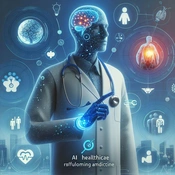The landscape of healthcare is undergoing a transformative revolution, driven by the powerful synergy of medicine and artificial intelligence (AI). No longer relegated to science fiction, AI is rapidly integrating into every facet of healthcare, from infectious disease tracking to pathology analysis, pharmacological research to psychiatric intervention. This dynamic partnership holds immense potential to revolutionize internal medicine, surgery, and the broader realm of social medicine.
Artificial intelligence (AI) has been rapidly transforming various industries, and healthcare is no exception. With its ability to analyze vast amounts of data, identify patterns, and make predictions, AI has the potential to revolutionize healthcare systems worldwide.
![]()
AI in Medical Diagnosis:
One of the most promising applications of AI in healthcare is in medical diagnosis. AI algorithms can analyze medical images, such as X-rays and MRI scans, with a high degree of accuracy to detect diseases and abnormalities. This can lead to earlier and more accurate diagnoses, potentially improving patient outcomes and reducing healthcare costs.
AI for Drug Discovery:
AI can also be used to accelerate the drug discovery process. By analyzing large datasets of molecular and clinical data, AI can help researchers identify new drug targets and design more effective treatments. This can significantly reduce the time and cost of bringing new drugs to market, making them more accessible to patients.
AI-powered Robotics:
AI is also revolutionizing the field of surgery. AI-powered robots can perform complex procedures with greater precision and accuracy than human surgeons. This can lead to shorter surgery times, less pain and scarring for patients, and improved overall outcomes.
AI in Personalized Medicine:
AI can also be used to personalize medicine. By analyzing individual patient data, AI can help doctors tailor treatments to each patient's unique needs and genetic makeup. This can lead to more effective and targeted treatments, with fewer side effects.
AI for Administrative Tasks:
AI can also be used to automate administrative tasks in healthcare systems, such as scheduling appointments, processing insurance claims, and managing patient records. This can free up doctors and nurses to spend more time with patients and focus on providing care.
Unlocking the Secrets of Life: AI in Cell Biology and Morphology
Imagine AI delving into the intricate world of cell biology, deciphering the complex dance of organelles and their impact on human health. By analyzing vast datasets of morphological data, AI algorithms can uncover hidden patterns and connections, identifying previously unknown disease markers and paving the way for earlier, more precise diagnoses. In the field of immunology, AI is already aiding in the development of personalized immunotherapies by analyzing an individual's unique immune profile.
AI as a Diagnostic Powerhouse: Revolutionizing Internal Medicine and Surgery
AI's analytical prowess is transforming internal medicine. From analyzing medical images with superhuman accuracy to identifying subtle patterns in patient data, AI can assist physicians in making faster, more informed diagnoses. Imagine radiological research powered by AI, automatically detecting even the faintest anomalies in X-rays and MRIs, potentially saving countless lives. In the realm of surgery, AI-powered robotic systems are offering unparalleled precision and minimally invasive procedures, leading to faster recovery times and improved patient outcomes.
Tackling Global Health Challenges: AI in Infectious Diseases and Social Medicine
The fight against infectious diseases takes on a new dimension with AI's ability to track disease outbreaks in real-time, predict their spread, and identify high-risk populations. This is particularly crucial in social medicine, where AI can analyze social determinants of health and allocate resources more effectively to vulnerable communities.
From Bench to Bedside: Streamlining Drug Discovery and Clinical Genetics
The arduous process of pharmacological research is being accelerated by AI, which can analyze massive datasets of genetic and molecular information to identify promising drug targets and predict their efficacy. This holds immense potential for personalized medicine, tailoring treatments to individual patient profiles based on their clinical genetics.
The Potential of AI in Healthcare and Ethical Considerations
While the potential of AI in healthcare is undeniable, ethical considerations cannot be ignored. Issues of data privacy, algorithmic bias, and the future of human-machine collaboration require careful consideration and responsible implementation. As we navigate this new frontier, ensuring transparency, accountability, and human oversight will be paramount.
Challenges in Implementing AI in Healthcare
While AI has the potential to revolutionize healthcare, there are also challenges and ethical considerations that need to be addressed. One challenge is ensuring that AI systems are accurate and reliable. Another challenge is ensuring that AI systems are used in a fair and ethical manner, and that they do not exacerbate existing inequalities in healthcare.
· Accuracy and Reliability:
AI systems must be thoroughly tested and validated to ensure that they provide accurate and reliable results. Any errors or biases in the algorithms can have serious consequences for patients.
· Fairness and Ethical Use:
It is essential to ensure that AI systems are used in a fair and ethical manner. This includes addressing issues of algorithmic bias and ensuring that the benefits of AI in healthcare are equitably distributed among all populations.
By addressing these challenges and ethical considerations, we can harness the full potential of AI in healthcare while also upholding the values of transparency, accountability, and human oversight.
The synergy of medicine and AI is ushering in a new era of personalized, predictive, and preventative healthcare. From microbiology research to psychiatric care, this powerful partnership holds the promise to tackle some of healthcare's most pressing challenges and unlock a future of unprecedented health and well-being for all.
